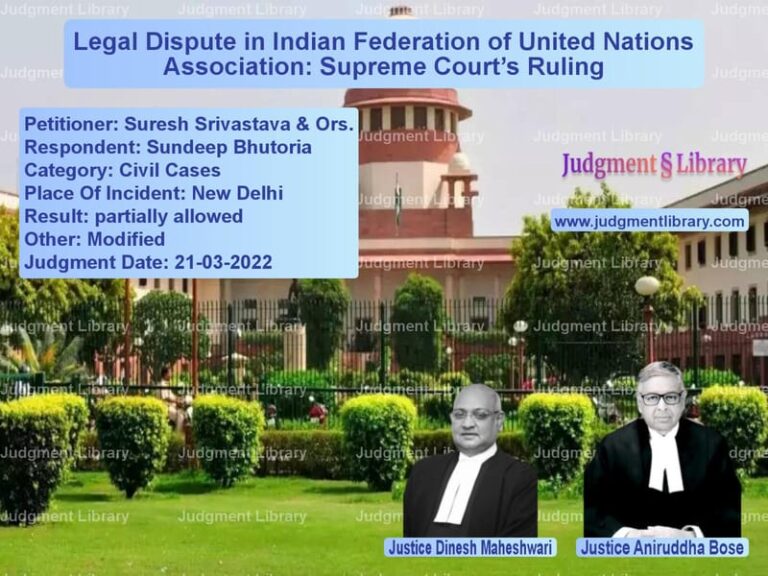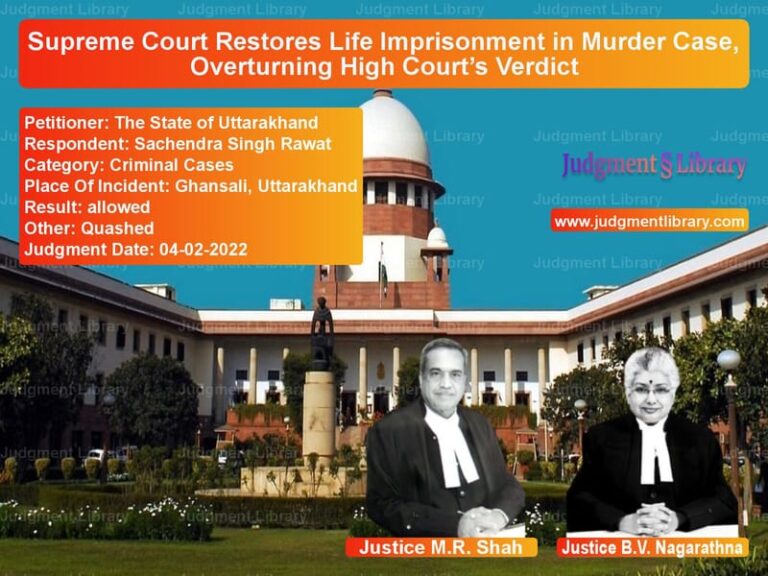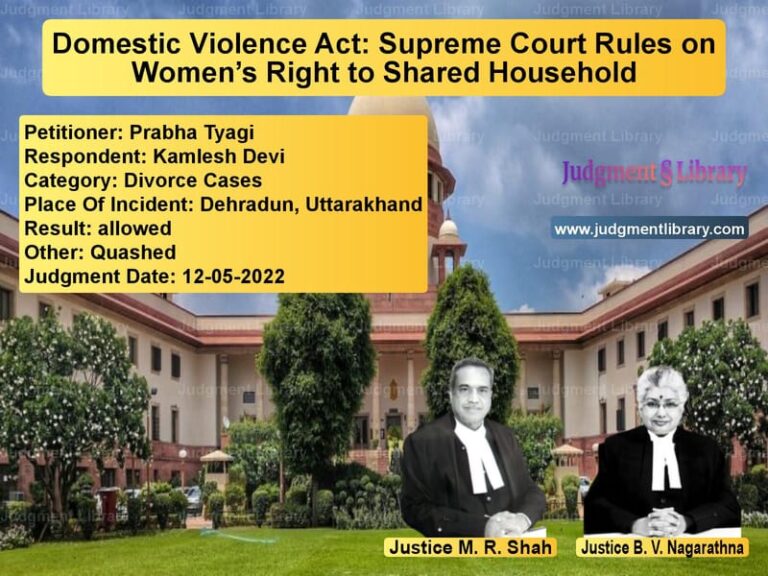Supreme Court Defines Jurisdiction in Cheque Dishonor Cases Under Negotiable Instruments Act
The Supreme Court of India recently delivered a landmark ruling in the case of M/s Shri Sendhur Agro & Oil Industries v. Kotak Mahindra Bank Ltd., addressing critical issues related to jurisdiction in cheque dishonor cases under Section 138 of the Negotiable Instruments Act, 1881 (N.I. Act). The case involved the question of whether the complaint should be heard in Chandigarh, where the cheque was presented, or in Coimbatore, where the transaction occurred.
Background of the Case
The case arose from a commercial loan transaction between the petitioner, M/s Shri Sendhur Agro & Oil Industries, a Tamil Nadu-based firm, and the respondent, Kotak Mahindra Bank Ltd., headquartered in Mumbai, with an operational branch in Chandigarh.
The petitioner had availed a loan from Kotak Mahindra Bank Ltd., and to fulfill the repayment obligation, issued cheques drawn on its account. When the cheques were presented for collection at the respondent bank’s Chandigarh branch, they were dishonored due to insufficient funds. Consequently, the respondent bank initiated proceedings under Section 138 of the N.I. Act, filing a complaint before the Court in Chandigarh.
Key Issues Before the Court
The primary issues raised in the case were:
- Whether the Court in Chandigarh had the jurisdiction to try the complaint when the petitioner’s account was maintained in Tamil Nadu.
- Whether the cheque’s presentation at the respondent’s bank branch in Chandigarh constituted a valid jurisdictional basis.
- Whether the petitioner’s plea for transfer of the case to Coimbatore was justified under Section 406 of the Criminal Procedure Code (CrPC).
Petitioner’s (M/s Shri Sendhur Agro & Oil Industries) Arguments
- The entire loan transaction took place in Coimbatore, Tamil Nadu, and there was no direct connection to Chandigarh.
- The company’s bank account, from which the cheque was drawn, was maintained in Coimbatore, making it the appropriate jurisdiction.
- The filing of the case in Chandigarh was an attempt by the respondent to harass the petitioner and force them into an unfair legal battle far from their place of business.
- The petitioner was facing financial difficulties, and requiring them to contest the case in Chandigarh would place an undue burden on them.
- The principle of natural justice demanded that the trial be conducted in a location where the petitioner could effectively defend itself.
Respondent’s (Kotak Mahindra Bank Ltd.) Arguments
- The cheque in question was presented for collection at the Chandigarh branch of Kotak Mahindra Bank, which granted jurisdiction to the Court in Chandigarh under the N.I. Act.
- The petitioner had issued the cheques knowing that they would be processed at the respondent’s branch in Chandigarh.
- Under the 2015 amendment to the N.I. Act, jurisdiction in cheque bounce cases is determined by the location of the bank branch where the payee maintains an account.
- The petitioner had defaulted on a substantial loan amount exceeding ₹34.14 crore, and their attempt to transfer the case was an act of delaying legal proceedings.
- There was no legitimate hardship in attending the case in Chandigarh, as the legal process allowed for virtual hearings and remote representation.
Supreme Court’s Analysis and Observations
1. Jurisdiction Under Section 138 of the N.I. Act
The Court reaffirmed the principle that jurisdiction in cheque dishonor cases lies where the cheque is presented for collection. The Court observed:
“Under the provisions of the Negotiable Instruments Act, as amended in 2015, the jurisdiction to try an offense under Section 138 is conferred on the Court within whose territorial limits the payee bank is located. The legislative intent behind this amendment is to prevent unnecessary forum shopping and ensure a predictable legal framework.”
Thus, since Kotak Mahindra Bank’s account was maintained in Chandigarh, the jurisdiction was properly vested in the Court in Chandigarh.
2. Transfer of Cases Under Section 406 CrPC
The Court addressed the petitioner’s plea for transfer of the case to Coimbatore. The Court held:
“The power to transfer a criminal case under Section 406 CrPC is an extraordinary jurisdiction that should be exercised sparingly and only in cases of demonstrable miscarriage of justice. The petitioner’s argument of inconvenience does not constitute a valid ground for transfer.”
3. Burden of Proof in Transfer Petitions
The Court emphasized that the burden of proving hardship or prejudice in transfer petitions lies with the petitioner. The Court noted:
“The mere assertion that a party finds it inconvenient to appear before a particular court is insufficient to warrant transfer. The petitioner must demonstrate that they are unable to receive a fair trial at the current venue. No such material has been presented before us.”
4. Virtual Hearings and Legal Representation
The Court also highlighted the availability of virtual hearings:
“In an era of digitized court proceedings, litigants are not necessarily required to appear in person for every hearing. The argument of logistical hardship is significantly diminished when virtual representation is an available option.”
5. Precedents Considered
- Dashrath Rupsingh Rathod v. State of Maharashtra (2014): Held that jurisdiction is where the cheque is presented for clearance.
- Bridgestone India Pvt. Ltd. v. Inderpal Singh (2015): Reaffirmed that the payee’s bank determines jurisdiction.
- K. Bhaskaran v. Sankaran Vaidhyan Balan (1999): Recognized multiple jurisdictions in cheque dishonor cases but was superseded by the 2015 amendment.
Final Judgment
The Supreme Court dismissed the petition and held:
“The petition seeking transfer of the criminal case from Chandigarh to Coimbatore is devoid of merit. The Court in Chandigarh has rightful jurisdiction, and no compelling reason has been provided to justify the transfer. The petition stands dismissed.”
Key Takeaways from the Judgment
- Jurisdiction in cheque dishonor cases is determined by the payee’s bank location, not the drawer’s account location.
- Transfer petitions under Section 406 CrPC require strong grounds of prejudice or unfair trial, which were not present in this case.
- Virtual hearings provide sufficient means for accused persons to contest cases in different jurisdictions.
- Inconvenience alone is not a ground for transferring criminal proceedings.
Conclusion
The Supreme Court’s decision in M/s Shri Sendhur Agro & Oil Industries v. Kotak Mahindra Bank Ltd. reinforces the principle that cheque dishonor cases must be tried in the jurisdiction where the payee’s bank is located. The ruling prevents forum shopping and ensures that financial institutions can effectively pursue legal action against defaulters. The judgment also clarifies that inconvenience in attending hearings is not a valid ground for transfer, especially with the availability of virtual legal proceedings.
Petitioner Name: M/s Shri Sendhur Agro & Oil Industries.Respondent Name: Kotak Mahindra Bank Ltd..Judgment By: Justice J.B. Pardiwala, Justice R. Mahadevan.Place Of Incident: Coimbatore, Tamil Nadu.Judgment Date: 06-03-2025.
Don’t miss out on the full details! Download the complete judgment in PDF format below and gain valuable insights instantly!
Download Judgment: ms-shri-sendhur-agr-vs-kotak-mahindra-bank-supreme-court-of-india-judgment-dated-06-03-2025.pdf
Directly Download Judgment: Directly download this Judgment
See all petitions in Fraud and Forgery
See all petitions in Bail and Anticipatory Bail
See all petitions in Judgment by J.B. Pardiwala
See all petitions in Judgment by R. Mahadevan
See all petitions in dismissed
See all petitions in supreme court of India judgments March 2025
See all petitions in 2025 judgments
See all posts in Criminal Cases Category
See all allowed petitions in Criminal Cases Category
See all Dismissed petitions in Criminal Cases Category
See all partially allowed petitions in Criminal Cases Category







